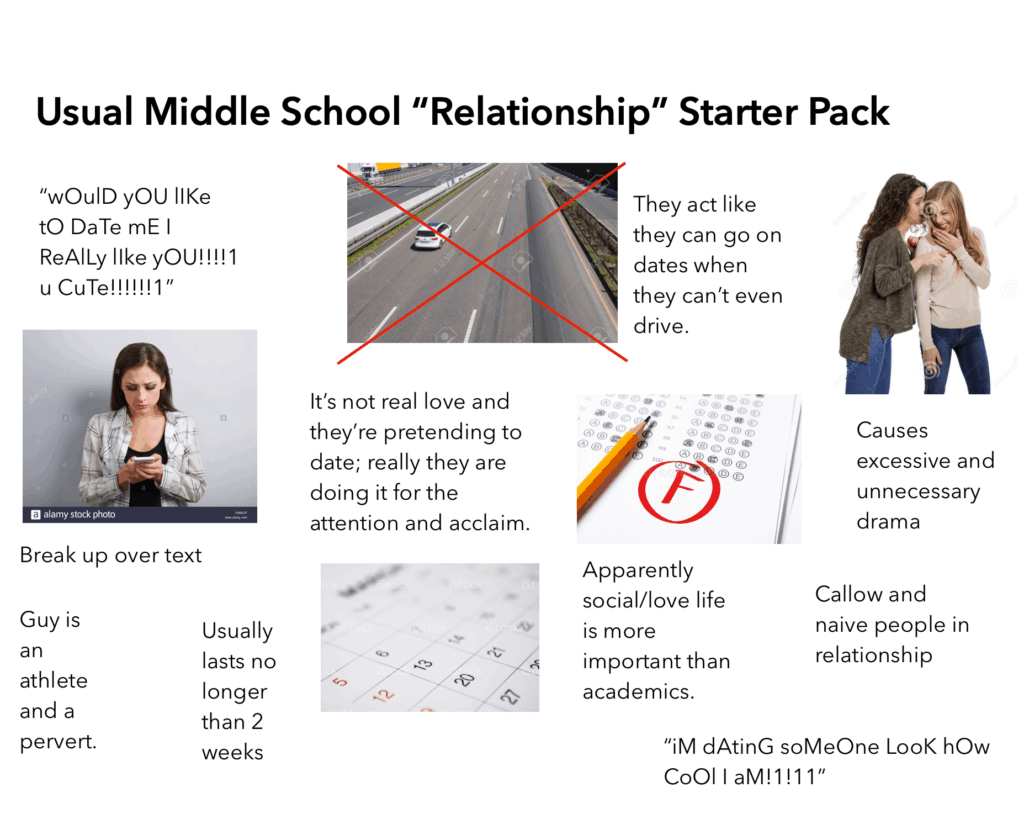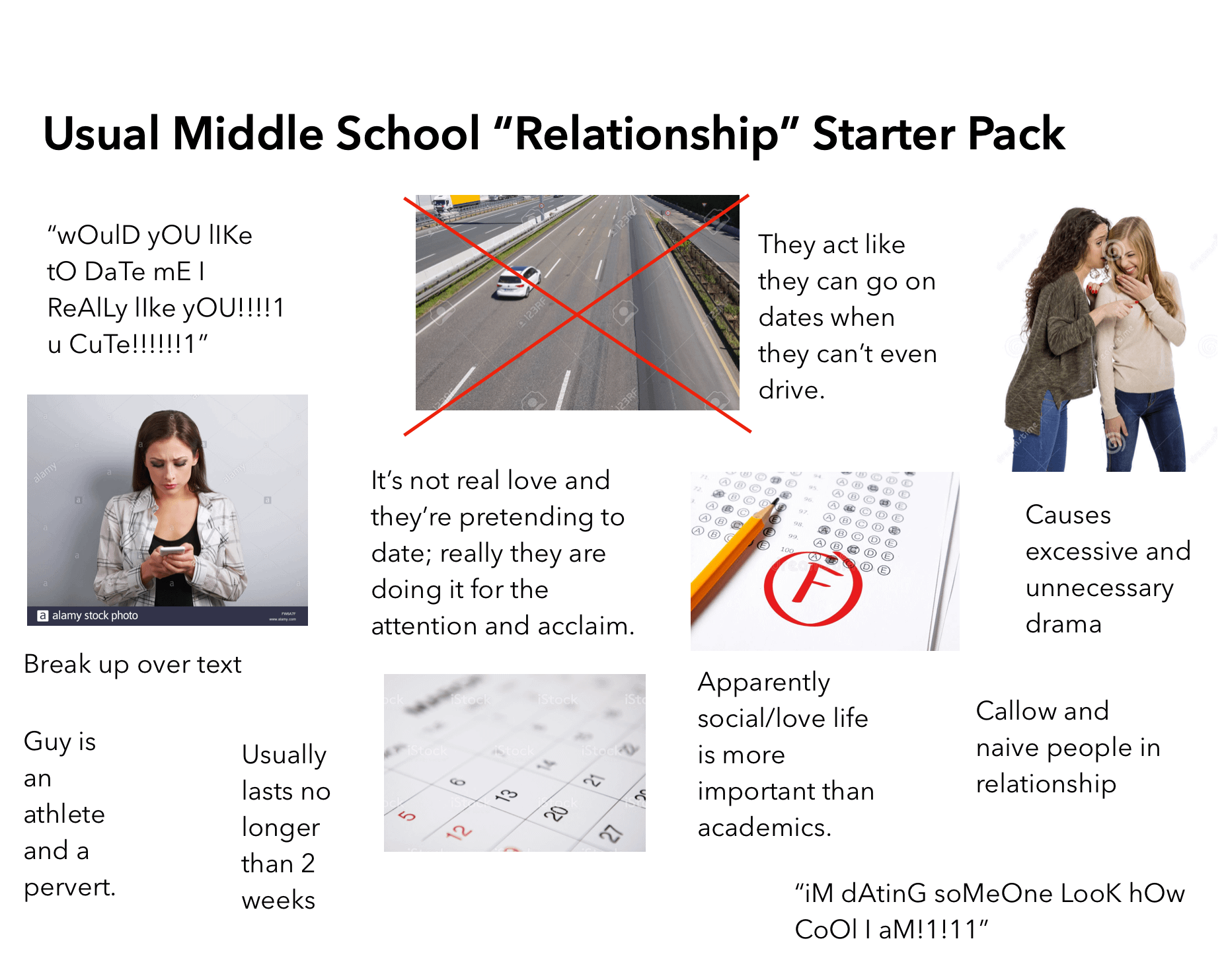
Navigating the Complexities of Middle School Dating: A Guide for Parents and Educators
Middle school is a period of significant social and emotional development. It’s a time when adolescents begin to explore their identities, form deeper connections with peers, and, inevitably, start to express interest in romantic relationships. The concept of middle schoolers dating can be a source of anxiety and confusion for parents and educators alike. Understanding the nuances of these relationships, setting appropriate boundaries, and providing guidance are crucial for supporting young people during this formative stage. This article aims to provide a comprehensive overview of middle schoolers dating, offering insights and practical advice for navigating this complex landscape.
Understanding the Landscape of Middle School Relationships
The term “dating” can mean different things at different ages. For middle schoolers dating often looks very different from high school or adult relationships. It’s less about formal dates and more about spending time together in groups, having crushes, and exploring feelings of attraction. These relationships are often characterized by:
- Short duration: Relationships in middle school tend to be fleeting, lasting weeks or even days.
- Group involvement: Much of the interaction happens within a larger social group, rather than one-on-one.
- Limited physical intimacy: Physical affection is usually minimal, such as holding hands or quick hugs.
- Experimentation: Middle schoolers dating is often about experimenting with different social roles and figuring out what they look for in a partner.
It’s important to recognize that these early experiences, while sometimes dramatic, are a normal part of growing up. They help adolescents develop social skills, learn about their own emotions, and build confidence.
Why Are Middle Schoolers Dating?
Several factors contribute to the rise of middle schoolers dating. These include:
- Peer influence: Seeing friends dating can create pressure to conform and participate in similar activities.
- Media influence: Movies, TV shows, and social media often portray romantic relationships as desirable and exciting.
- Hormonal changes: Puberty brings about hormonal changes that can intensify feelings of attraction and desire.
- Social development: Middle school is a time of intense social development, and exploring romantic relationships is part of that process.
- Seeking validation: Some middle schoolers dating do so to feel accepted, popular, or valued by their peers.
The Potential Challenges of Middle School Dating
While middle schoolers dating can be a positive experience, it also presents several potential challenges:
- Emotional immaturity: Middle schoolers may lack the emotional maturity to handle the complexities of romantic relationships, leading to misunderstandings and hurt feelings.
- Social drama: Relationships can create social drama and conflict within friend groups.
- Distraction from academics: Obsessing over a relationship can distract students from their studies.
- Pressure to engage in risky behaviors: Some middle schoolers dating may feel pressured to engage in behaviors they are not ready for, such as sexual activity or substance use.
- Cyberbullying: Social media can exacerbate relationship drama and lead to cyberbullying.
Setting Boundaries and Expectations
Parents and educators play a crucial role in helping middle schoolers dating navigate these challenges. Setting clear boundaries and expectations is essential. This includes:
- Open communication: Create an open and honest dialogue about relationships, dating, and sexuality.
- Establishing rules: Set clear rules about acceptable behavior, such as curfews, appropriate online interactions, and expectations for respect and consent.
- Monitoring social media: Keep an eye on your child’s social media activity to ensure they are not being exposed to inappropriate content or engaging in risky behavior.
- Encouraging healthy relationships: Talk about what constitutes a healthy relationship, including respect, communication, and trust.
- Promoting self-esteem: Help your child develop self-esteem and confidence so they don’t rely on relationships for validation.
Tips for Parents
Here are some specific tips for parents dealing with middle schoolers dating:
- Stay calm: Avoid overreacting or dismissing your child’s feelings.
- Listen actively: Pay attention to what your child is saying and try to understand their perspective.
- Ask questions: Ask open-ended questions to encourage your child to talk about their relationships.
- Share your experiences: Share your own experiences with dating and relationships to help your child learn from your mistakes and successes.
- Be a role model: Model healthy relationship behaviors in your own life.
- Know their friends: Get to know your child’s friends and their families.
- Discuss consent: Emphasize the importance of consent and respect in all relationships.
Tips for Educators
Educators can also play a significant role in supporting middle schoolers dating. This includes:
- Creating a safe and inclusive classroom environment: Foster a classroom environment where students feel safe to express themselves and ask questions about relationships.
- Addressing relationship topics in the curriculum: Incorporate discussions about healthy relationships, consent, and communication into the curriculum.
- Providing resources and support: Offer resources and support for students who are struggling with relationship issues.
- Collaborating with parents: Communicate with parents about relationship issues and work together to support students.
- Enforcing school policies: Enforce school policies related to harassment, bullying, and dating violence.
Addressing Specific Concerns
Certain scenarios regarding middle schoolers dating may require more specific attention:
Bullying and Cyberbullying
If your child is being bullied or cyberbullied as a result of a relationship, take immediate action. Report the bullying to the school and, if necessary, involve law enforcement. Help your child document the bullying and provide them with support and counseling.
Unhealthy Relationships
If you suspect your child is in an unhealthy or abusive relationship, intervene immediately. Talk to your child about the signs of an unhealthy relationship, such as control, jealousy, and disrespect. Help them develop a safety plan and seek professional help if needed.
Early Sexual Activity
If you are concerned that your child is engaging in early sexual activity, have an open and honest conversation about the risks and responsibilities involved. Provide them with accurate information about contraception and sexually transmitted infections. Encourage them to make informed decisions about their sexual health.
The Importance of Self-Esteem
Ultimately, the best way to help middle schoolers dating navigate the complexities of relationships is to foster their self-esteem. When young people feel good about themselves, they are less likely to seek validation from others and more likely to make healthy choices. Encourage your child to pursue their interests, develop their talents, and build strong relationships with friends and family. Remind them that they are valuable and worthy of love and respect, regardless of their relationship status. Building self-esteem is crucial during the years when middle schoolers dating becomes a topic of discussion and a lived experience.
Conclusion
Middle schoolers dating is a normal and natural part of adolescent development. By understanding the nuances of these relationships, setting appropriate boundaries, and providing guidance, parents and educators can help young people navigate this complex landscape in a healthy and responsible way. Remember to prioritize open communication, promote self-esteem, and address any concerns promptly and effectively. With the right support, middle schoolers dating can be a positive learning experience that helps them develop valuable social and emotional skills.
[See also: Understanding Adolescent Development]
[See also: Talking to Your Child About Sex]
[See also: Preventing Bullying in Schools]

